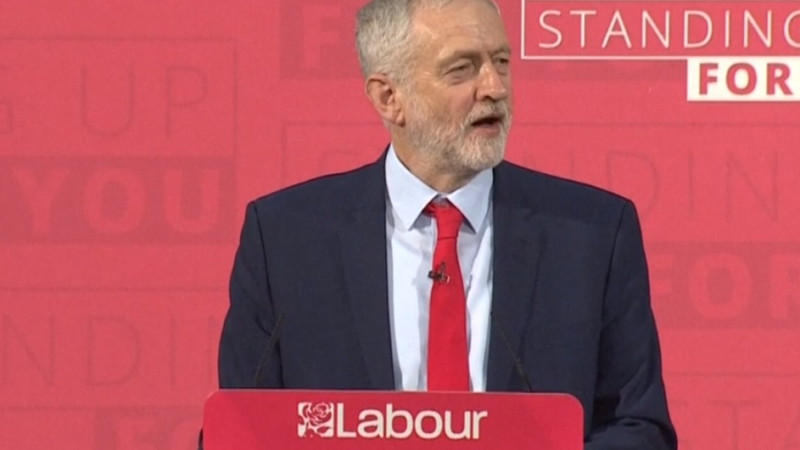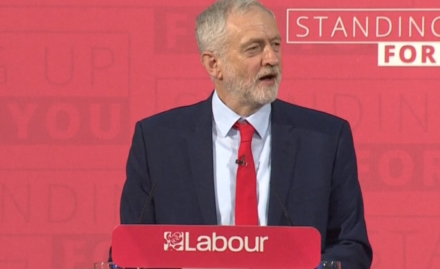

Theresa May’s cut-and-run general election caught the Labour Party without a campaign slogan.
Labour had many other gaps, but lack of a slogan should be easy to remedy. Let us look at those which won elections in the past. In 1923 it was “Work or maintenance.” In 1929 Labour effectively took over Lloyd George’s promise “We can conquer unemployment.” For the 1945 landslide it used the stately “Let us face the future”, echoed less successfully five years later in “Let us win through together.”
Harold Wilson squeaked through in 1964 with “The new Britain” and the catchier “Let’s go with Labour and we’ll get things done.” Two years later he earned a thumping majority with “Time for decision”. He got Labour back into power, just, in February 1974, with “Let us work together – Labour’s way out of the crisis”. The Liberals had a much snappier slogan for an election dominated by the miners’ strike and the three-day week of energy rationing: “Take power, vote Liberal.”) In October 1974 Wilson squeaked back in through “Britain will win with Labour.”
Then Labour had to wait 23 years for its next election victory. In 1997 Tony Blair won a landslide with “New Labour because Britain deserves better.” In 2001 he offered “Ambitions for Britain” and in 2005 “Britain forward, not back.”
With the exception of “Work or maintenance” none of these slogans committed the party to anything. Each served to create a vaguely uplifting atmosphere around a Labour government. The party should have been able to match them in short order, but its first reported effort at a slogan for 2017 was appalling: “the Tories are the real extremists”.
But Labour’s replacement is not much better: “for the many not the few.”
Blairites have pointed out gleefully that this was first used by Tony Blair. Nothing wrong with that: he did win three elections although there was terribly little to beat.
With Blair, the phrase meant nothing at all. It joined that long mist procession of verbless sentences which characterised his political output, along with a “young country”, a “stakeholder society,” and of course “tough on crime, tough on the causes of crime” which he took from Gordon Brown.
Whatever his other faults, Jeremy Corbyn does not do empty soundbites. He undoubtedly means “for the many, not the few” in dead earnest.
He and the Labour party are making a double mistake.
First, they are lumping voters into an anonymous, characterless mass.
Secondly, they are assuming that the many are poor and downtrodden. Labour made exactly the same mistake in 1983. It was pure Morrissey politics: Heaven knows I’m miserable now (a song written a year later). That style comes naturally to Corbyn. If he got into heaven, he would find angels suffering from an appalling shortage of harp strings.
Most people are not miserable now and even if they were, it is foolish for Labour to identify itself with a suffering many and the Tories with a successful few. Millions of miserable people across the world believe that one day they will join the successful few. They continue to believe that conservative parties will get them there faster and that these will certainly defend their interests better when they arrive in the few.
Labour nationally – and individual candidates – still have time to look for alternatives. They might do better with two connected slogans: “You don’t have to take what you’re given: vote Labour” and “Take back control of your life: vote Labour.”
Both of these address voters personally. They are both universal in their appeal and make no assumptions about where voters are in present society. The first is taken from the most vivid part of Corbyn’s first party conference speech. I should know because I wrote it, as a simple statement of Labour’s basic purpose. The second is stolen deliberately from the Leave campaign’s successful (but not copyrighted) slogan – which means that it would be talked about.
It would speak to the millions of people who are not miserable but are working harder and harder to stay in the same place, living on terms set by others which they have little power to challenge or change. It would be a good frame for Labour policies to improve economic security, such as the recent 20-point plan for workers (although 20 is far too many items in any plan, which should always consist of a small odd number, preferably three).
If the party persists with Morrissey politics, it could fashion a more appealing slogan from another of his songs. “Sing your life: vote Labour.”
Richard Heller is an author and journalist. He was chief of staff to Denis Healey and to Sir Gerald Kaufman. His latest book, White On Green, celebrates the drama of Pakistani cricket.




More from LabourList
‘Factionalism at the top is weakening Labour – and handing a gift to Reform’
‘Europe must stand strong on its own as US security guarantees grow conditional’
‘Tackling poverty should be the legacy of Keir Starmer’s government’